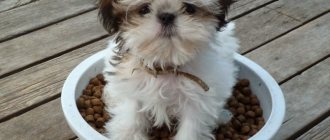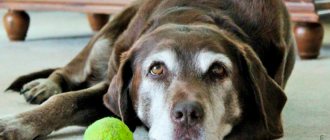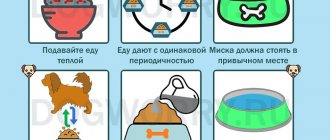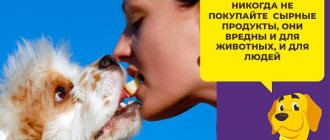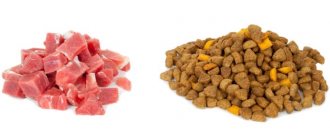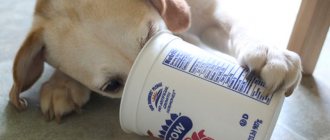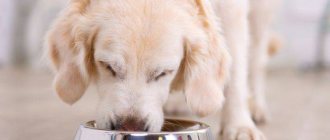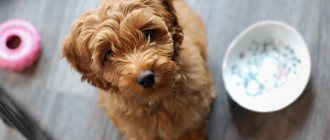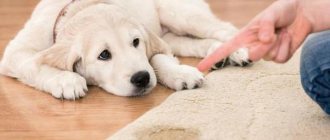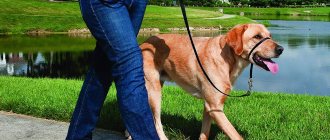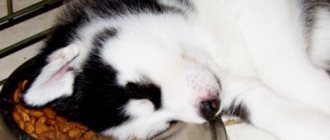What foods should a dog not eat?
Prohibited foods for dogs include:
- grapes (highly likely to cause poisoning);
- avocado (poisonous product for dogs);
- unripe tomatoes (also poisonous);
- eggplants (the peel contains poison that causes poisoning);
- nuts (heavy and not healthy food for dogs);
- mushrooms (similarly, they can also cause poisoning);
- too fatty foods - soup , broth, sour cream, etc. (can cause intestinal upset with single use, and with frequent use lead to pancreatitis);
- milk (it causes diarrhea and gas);
- pits of apricots, plums, cherries and cherries (contain poisons);
- sweets (can cause diabetes);
- spicy and too salty;
- marinated, fried, smoked;
- onion and garlic;
- cereals (bread and cereals, according to canine nutritionists, are harmful food: they are fed only to reduce the cost of the diet).
It is better not to give some foods, for example, grapes at all, and not to check whether the dog will have a negative reaction to it. But some foods, for example, a piece of butter, are acceptable, if not regularly and not a lot.
EXPERT COMMENT:
Doctor of Veterinary Medicine from the USA Karen Baker
The dog is a descendant of the wolf from the family of carnivores. That is, she is also a predator. The DNA of a dog and a wolf is 99.9% identical. Over the past 2000-3000 years, the phenotype - the appearance of the animal - has changed. Bald, short-legged, short breeds appeared. And despite this, wolf DNA remained. Therefore, grains are not recommended for dogs as a regular diet.
Nutritional Features
Feeding a Miniature Schnauzer has some peculiarities. Given the hyperdynamic nature of his character, he needs a sufficient amount of calories.
- Maintain a ratio of 75% animal products to 25% plant products. The proportion is suitable for feeding puppies, as well as adult dogs.
- Miniature Schnauzers should not be given fat-containing foods, as they can provoke an attack of pancreatitis.
- In winter, vegetable oils should be added to food (1 teaspoon per day). Food should be warm and in a liquid state.
- After the trimming procedure, the dog can benefit from nutritional supplements containing seaweed, chitinous mollusk shells, salmon oil and other preparations that stimulate hair growth.
Table of permitted and prohibited products
| Category | Useful | Conditionally permitted | Prohibited |
| Animal meat | Beef, veal, horse meat | Mutton | Pork |
| Poultry meat | Chicken meat | Duck | – |
| Vegetables | Carrots, zucchini, pumpkin, broccoli, cauliflower | White cabbage, beets, cucumber, tomatoes | Potatoes, corn, onions, garlic, legumes |
| Fruits, berries | Apple, pear, persimmon, prune | Berries | Citrus |
| Cereals | Rice, buckwheat, | Millet, pearl barley, barley, oatmeal | Manna |
| By-products | Scar, trachea, liver, heart, tongue, lung | – | – |
| Fish and seafood | Sea fish fillet, seaweed, shrimp meat | – | River fish |
| Milk products | Cottage cheese, kefir, sour cream with minimal fat content | Cow's milk | – |
| Oils | Olive, butter, flaxseed, sunflower | – | – |
| Others | Eggs, cheese | – | Pasta and bakery products |
Absolutely not
- sweets;
- smoked meats;
- pickles and marinades;
- sausages and semi-finished products.
Miniature Schnauzers are allowed to be fed raw meat. However, keep in mind that it must first be frozen well.
How to feed an adult miniature schnauzer
An adult miniature is a small dog, but it retains its activity and curiosity throughout its life. He needs regular physical exercise, and the owner should think about a sports career for his four-legged friend. Miniatures are successful in many disciplines, but they are especially good at agility.
The dog's diet is selected based on increased energy consumption. The dog should not gain excess weight; it is important that he maintains good physical shape and receives the right amount of vitamins and minerals.
Experts recommend adjusting your pet’s menu depending on the time of year - in the off-season, the dog should receive more vitamins and fiber, consume fewer calories in winter, and in summer it should focus on the exercise received.
Proper nutrition is the key to the health of every dog. For miniature schnauzers, which include dogs prone to food allergies and kidney disease, diet is very important in maintaining health. In addition, the miniature schnauzer's nutrition should take into account its excellent appetite, which, with a lack of exercise, will inevitably lead the dog to excess condition, otherwise obesity.
Some manufacturers of ready-made dry diets produce specialized food for miniature schnauzers, which contains substances that prevent the formation of stones and inflammation in the bladder. There is a great temptation to switch your dog to this food and feel calm. And you don’t have to constantly wash your beard.
READ Lyalius proper care for aquarium fish
The benefits of ready-made food are especially noticeable when raising miniature schnauzer puppies in the winter. At this time, the question of what food to feed the miniature schnauzer mother and her litter is usually not worth it - ready-made food is used - starters, low-fat cottage cheese, kefir, quail eggs and fresh meat. Before feeding, the meat is well frozen to avoid infection with worms, and then scraped with a knife and well-soured kefir or curdled milk is added to it.
Bitches who bring puppies burping should not be discouraged - this is a natural process that establishes normal digestion in puppies. It is interesting that in this way the bitch can bring not only natural food, but also dry food, giving it to the puppies in a semi-digested form.
When it reaches its owners at the age of 2-4 months, the little one already has its own eating habits. And although the breed usually has a strong stomach and an excellent appetite, it is not uncommon to change the baby’s diet after he moves into your home. At first, you need to offer him familiar foods so as not to cause upset. The puppy is transferred to a new diet no earlier than a week later, gradually introducing new foods into the diet and observing its excrement.
Feeding a miniature schnauzer puppy under 4 months of age is carried out 4 times a day. From 4 to 9 months, the dog is fed three times a day, and then switches to twice a day. Variations are possible in the proposed scheme. If you see that the puppy refuses food at one of the meals, you can reduce their number, accordingly increasing the amount of food per meal.
From two months, the starter food is replaced with food for miniature schnauzer puppies or for puppies, by-products are introduced (stomach, esophageal meat, beef cheeks, minced in a large meat grinder or cut into medium-sized pieces), fruits (apples, pears), vegetables (carrots, pumpkin, beets, tomatoes in small quantities).
The diet of a miniature schnauzer over a year old depends on the degree of its activity. You should not give your dog a lot of high-calorie food if it does not walk much and does not waste the energy received during feeding. There is no sadder picture than a fat, lazy miniature schnauzer. Incapable of running quickly or jumping over obstacles.
In addition, excess weight is the first step towards diabetes in a dog. Most often, excess weight is found in neutered dogs, whose hormonal status prevents a high level of activity and does not allow them to effectively burn excess calories. In this case, use a special food for miniature schnauzers of the “light” brand, intended for overweight dogs.
At any age, fatty foods are contraindicated for dogs of this breed. This applies to hard cheeses with a high fat content, fatty chicken or lamb. The pancreas of these dogs copes very poorly with such products and abuse of them can cause pancreatitis in the dog.
In winter, vegetable oil is added to the diet in the amount of a teaspoon per day. If a dog spends a lot of time outside, its food should be more liquid and warm to compensate for the inaccessibility of water in cold weather and help maintain optimal body temperature.
After trimming, additives containing seaweed and chitinous mollusk shells are introduced into the miniature schnauzer’s diet. At this time, salmon oil is also useful, as well as vitamin preparations for hair growth. If you decide to speed up your dog's hair growth with biotin supplements, do not use enhanced formulas and combine them with supplements that improve coat coarseness.
A mated bitch is switched to puppy diets from the second month of pregnancy. At this time, she is given calcium supplements, pumpkin containing antioxidants, boiled fish, quail eggs, and vitamins for nursing bitches and puppies. In the first month of pregnancy, it is not recommended to increase the diet, so as not to provoke obesity, which usually weakens labor.
At the age of over 8 years, the question of how to feed a miniature schnauzer again faces its owner. At this age, the dog needs food from easily digestible foods, in addition, calcium supplements and meat should be present in the diet. But the amount of porridge at this time needs to be reduced, leaving only rice and oatmeal in small quantities in the diet.
With age, the number of feedings can be increased again to three, and the doses reduced, since the energy needs of an older dog are low. Be sure to introduce foods containing fatty acids at this time - boiled sea fish, salmon oil, which will help keep blood vessels and coat in excellent shape.
READ Mulard ducks - breeding, raising and feeding at home, photo video
Features of feeding puppies
At 1 month
At the age of 1 month, Miniature Schnauzer puppies are given their first complementary foods: calcined cottage cheese, goat milk, meat pates, rice porridge and boiled carrots.
Portions are calculated based on the weight of the puppies and their intestinal function is monitored. Up to 2 months, puppies continue to simultaneously feed on mother's milk.
What to feed a puppy at 2 months
From 2 months of age, puppies are allowed (in small portions) foods from the diet of an adult dog, excluding offal and raw meat. Up to 4 months, Miniature Schnauzers are fed 5 times a day, excluding night feeding.
In addition to meat, cereals and vegetables, puppies can add boiled sea fish (2 times a week) and egg yolk (2-3 times a week) to their diet.
At 4 months
From 4 months, the number of feedings is reduced, gradually transferring the pet to 3 meals a day. At this age, the puppy can try raw meat, and then offal. Daily food intake at this age is 400 grams.
You can feed puppies with dry industrial food, the drying food is pre-soaked in water. You need to switch to dry food from natural food gradually, over 7-10 days.
Mixing homemade food with industrial dry food is not recommended. The digestive system, liver and pancreas of the animal are tuned to a certain rhythm of work, and mixing can lead to their failure.
Feeding an adult dog
An adult Miniature Schnauzer is a small, but very active and curious dog. In addition, the breed is not unfamiliar with the skill of guarding the home and protecting the owner. To eliminate possible negative factors (damage to furniture or shoes), representatives of the breed are recommended to play sports, for example, agility.
Based on energy requirements, an adult pet should receive an individually selected diet. The golden mean is the absence of excess weight, activity, a sufficient amount of nutrients, vitamins and microelements.
Advice: adjust your pet’s diet depending on the season of the year, in spring and autumn, enrich it with vitamins and fiber; in winter, a light menu is optimal; in summer, depending on the load.
A pet that has celebrated its 7th birthday is considered elderly . Miniature Schnauzers remain active even at an advanced age, but their diet needs to be lightened. Changes should affect the amount of slow carbohydrates; they need to be replaced with lighter or protein foods . The need for vitamins does not decrease, but older dogs are given individual courses, for example, with chondroprotectors .
Note! Older Miniature Schnauzers are prone to obesity.
Feeding dry food
There is no consensus on which brand of dry food is best to feed Miniature Schnauzers. What suits one dog may not suit another. It is clear that dry food should be of premium quality.
Dog food should not contain antioxidants: Ethoxyqun, BHA, BHT, Propylgallate. Before purchasing food, study the ingredients. Meat should come first, not rice or beet pulp.
From poor food, Miniature Schnauzers can develop: allergies, itching, dandruff, ear and eye problems, and black-haired dogs can begin to turn red.
Choosing Dog Food
Owners who are poorly versed in feeding dogs find that a wide selection of food allows them not to think about their diet. Purchasing the right type of food is quite difficult. If you have finally decided that you will feed your pet dry food, then there are some tips for you:
Find the best views. Buy premium and super premium food. It is worth giving your preference to companies based on the treats of barking companions .
Miniature Schnauzers should be given food for the small category. And also choose based on the age, weight and individual characteristics of the pet.
The breeder is sufficiently informed about what to feed the miniature schnauzer. He has an advantage in experience and knowledge, so you should not ignore the advice.
Don't forget that even the most expensive type of food may not be suitable for your pet. Pay attention to the appearance of itching, rashes, tears, and flatulence. Once you have chosen the right type of food, do not try to diversify your diet. Your pet needs good digestion more than variety.
If you decide to support a human friend with ready-made food, then you save yourself from the need to pre-process the food. You are only obligated to present food to your pet in the amount specified by the manufacturer.
Keep in mind that the daily value is often written. Remember that the miniature constantly needs fresh water. Don't forget to regularly update your drinking bowl. This is especially important if you feed your dog commercial solid food.
Caring for an elderly pet
The elderly age of miniatures begins at the age of 7, and although the pet remains cheerful and active, its diet changes - slow carbohydrates are removed from it, replacing it with light and protein components. The dog still needs vitamins as before, but veterinarians advise replacing the usual menu with food suitable for older dogs.
READ Labrador Retriever: photo, description and character of the dog breed
And with natural feeding, courses of chondroprotective drugs are prescribed that support healthy bones and joints. It is worth considering that, like other older dogs, older miniature dogs have a tendency to become obese.
